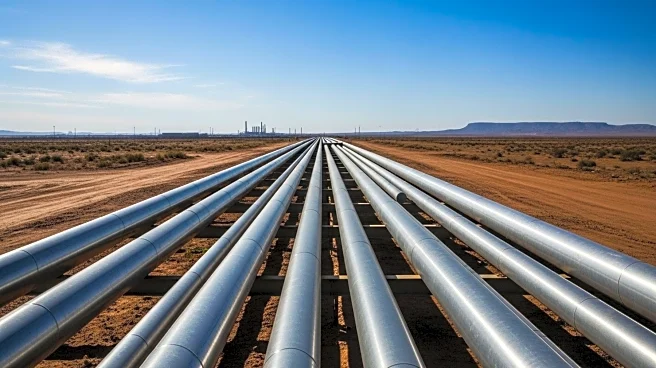What's Happening?
The Caspian Pipeline Consortium (CPC) has increased its oil exports by 9% per day in September compared to August, reaching 6.6 million metric tons or 1.75 million barrels daily. This pipeline, which carries over 80% of all Kazakh crude oil exports, transports the oil to Russia's Yuzhnaya Ozereevka Terminal in the Black Sea. CPC is owned by major U.S. oil companies, including Chevron and Exxon Mobil. The increase in oil supply from Kazakhstan rose from 5.703 million tons in August to 6.043 million tons in September. Meanwhile, Russian oil exports through the consortium fell slightly from 601,000 tonnes to 583,000 tonnes. CPC has not commented on its commercial activities.
Why It's Important?
The increase in oil exports by the Caspian Pipeline Consortium is significant for U.S. oil companies like Chevron and Exxon Mobil, which are stakeholders in CPC. This development could enhance the supply chain and potentially stabilize oil prices, benefiting the U.S. energy sector. The rise in Kazakh oil exports may also influence global oil markets, impacting pricing and availability. Additionally, the slight decrease in Russian oil exports could shift market dynamics, affecting international trade and energy policies. Stakeholders in the U.S. oil industry may see increased revenues and strategic advantages from this export boost.
What's Next?
The increase in oil exports may lead to further strategic decisions by U.S. oil companies involved in the consortium. They might explore expanding their operations or investing in infrastructure to support increased export volumes. Additionally, geopolitical factors could influence future export levels, especially considering the pipeline's route through Russia. Monitoring international relations and market demands will be crucial for stakeholders. Potential reactions from environmental groups and policymakers regarding increased fossil fuel exports could also shape future developments.
Beyond the Headlines
The boost in oil exports by CPC may have broader implications for energy security and geopolitical relations. As the pipeline plays a crucial role in transporting Kazakh oil, its operations could affect regional stability and international energy policies. The involvement of major U.S. oil companies highlights the interconnectedness of global energy markets and the strategic importance of such infrastructure. Long-term shifts in energy consumption patterns and environmental considerations may also arise from increased fossil fuel exports.










